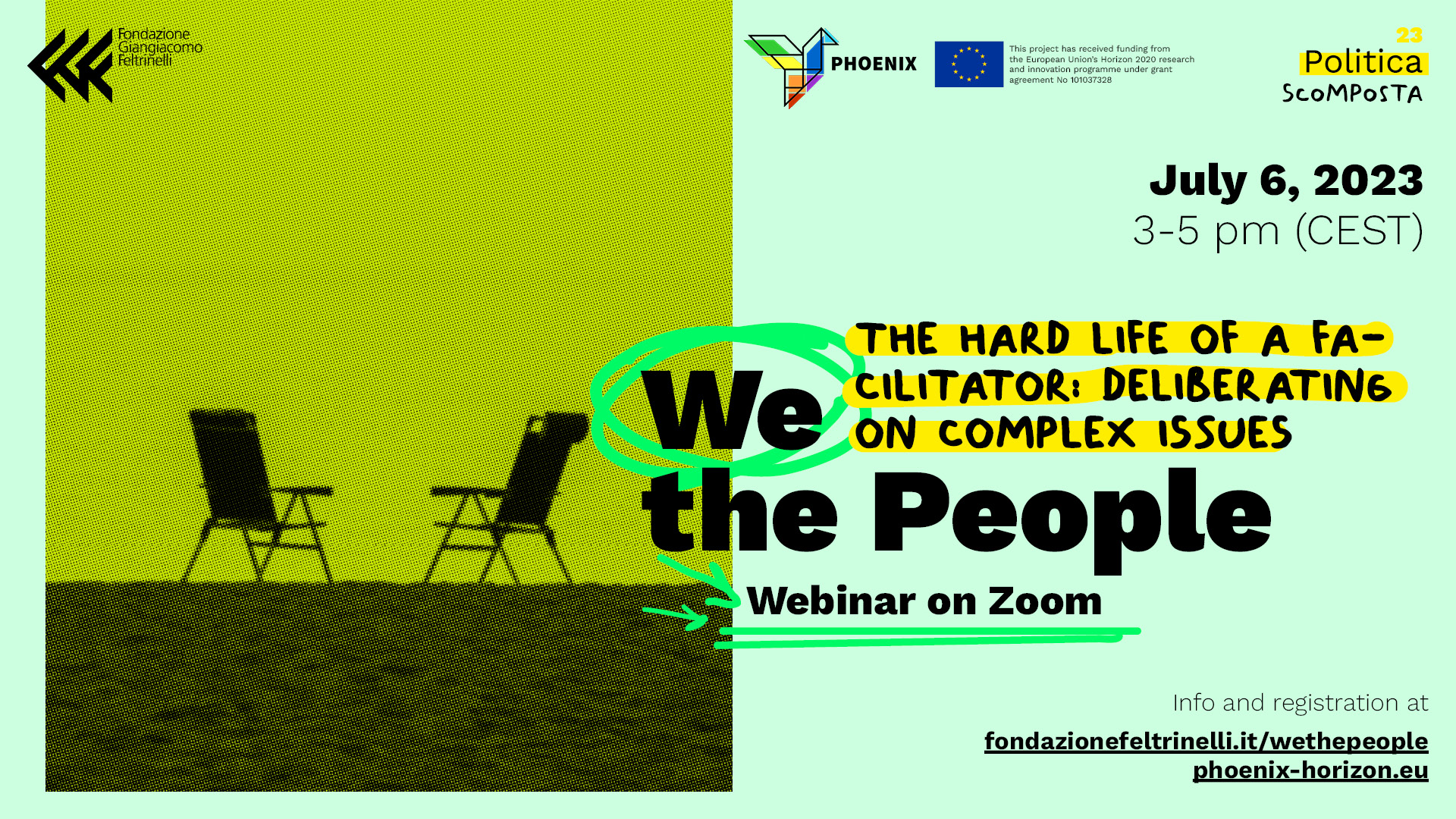6 July 2023 | 3-5 pm (CEST)

The Hard Life of a Facilitator: Deliberating on Complex Issues
Institutionalised participatory processes engage professionals with the purpose of facilitating the debate. To ensure that everyone involved in the process has an equal opportunity to express their views, the so-called “facilitators” developed specific skills that enhance social dialogue.
How do these skills turn into practical interventions? How should we conceive facilitators’ role in the deliberative democratic arenas? Are these experts crucial in conveying complex issues such as climate change? In this webinar, we will strive to answer these and similar questions.
Main speakers
Iolanda Romano
Architect and expert in participatory communication and public conflict mediation. Founder of Avventura Urbana.
Ondřej Filipec
Assistant Professor at the Faculty of Law, Palacký University Olomouc.
Carlo Martini
Associate Professor of Logic and Philosophy of Science, Vita-Salute San Raffaele University.
Rafaela Scheiffer (Moderator)
Researcher at Associação Oficina de Planeamento e Participação
Roundtable participants
Luca Ausili, Università Vita-Salute San Raffaele
Julie Malaize, Debating Europe
Cecilia Biancalana, Università degli Studi di Torino
Alessandra Cardaci, Debating Europe
Sophie Guillain, Res publica
Maurizio Mascitti, Università Vita-Salute San Raffaele
Gloria Origgi, Institut Jean Nicod
Stefano Sotgiu, Prossima Democrazia
Agenda
15:00 – 15:05 Introduction greetings Fondazione Giangiacomo Feltrinelli
15:05 – 15:15 Introduction by Rafaela Scheiffer (moderator)
15:15 – 15:30 Speech by Iolanda Romano
15:30 – 15:45 Speech by Ondřej Filipec
15:45 – 16:00 Speech by Carlo Martini
16:00 – 16:10 Comments by Gloria Origgi
16:10 – 16:40 Roundtable
16:40 – 16:55 Q&A by auditors
16:55 – 17:00 Closing remarks
Links:
About "We the People. The Rise of Citizens’ Voices"
Is it a crisis of democracy, or rather a crisis of participation within democracies, that we are facing? What factors contribute to the growing tendency to limit citizens’ involvement in the electoral process?
The issue of the complex, yet virtuous, relationship between information, liberal democracy, and the market economy has been extensively researched and analyzed. Recent high-tech innovations have posed significant challenges as they occurred amid geopolitical transformations, such as the end of the bipolar world, the European Union’s rapid expansion, and the collapse of the social prestige of the intermediate bodies. These changes have occurred alongside dramatic globalization, the rise of neoliberalism, and a prevailing culture of narcissism and individualization.
As a result, we find ourselves in a representative system that fails to adequately address people’s demands. The only way out of this democratic deficit is a renewed and fruitful dialogue between the public and institutional spaces. How can we reconnect citizens with administrative representatives? How can we overcome the top-down technocratic management and ensure that citizens’ voices actually contribute to policy co-creation? To answer these crucial questions, we must explore the trends of Democratic Innovations (DIs) and the potential benefits of the improvement of digital democracy.
Deliberative and participatory democracy becomes even more vital if we aim at pursuing the green transition, as any transformative process requires broader support to be efficient. Moreover, we cannot achieve an equal, just, and sustainable Green Deal unless we acknowledge the interests of those who will mostly be impacted by decision-making.
On the other hand, a technocratic approach will result in backlash, as there is no flawless and encompassing solution that can be posed to the climate crisis and get a unanimous consensus. What matters, instead, is that throughout the process, people’s needs are duly considered, debated, and represented.
This is the driving force that inspires the work of the PHOENIX Project: to gather civil society, stakeholders, practitioners, and anyone capable of contributing valuable discourse while advocating for the interests of the least represented and advantaged individuals in society.
The purpose of this series of webinars is to empower participants to become acquainted with the latest trends in Democratic Innovations while investigating the potential and the obstacles facing participatory and deliberative democracy. Following each workshop, we will contemplate how to foster participation beyond the local level and include the interests of minorities by placing them in the context of larger citizen groups. We will reflect on the conditions for thriving participatory processes based on mutual trust and respect, and whether such democratic experiments can actually reduce the gap between participation and representation.
Next webinars
7th September How to perform your interests during deliberation. Democracy beyond the exit strategies

Follow us on: